In the lively bustle of the local food court, waiters with welcoming air move with habitual, precise gestures. The lit fires illuminate the restaurants, where grills and sizzling pans spread spicy aromas into the air, offering a backdrop to the scattered conversations. Behind the counters there are men in long white tunics, their faces marked by the heat of the flames. With decisive moves they stir steaming rice, turn skewers, and knead bread with quick, decisive. Experience and pride fill every gesture, as if each dish were both an offering of hospitality and a reflection of life in Oman.
One after another, local customers make their way through the crowd to collect their dinner, then head toward the tables just a little further away. Voices intertwine, spirits are high.
It’s a warm evening in the hottest season in Salalah, in the Dhofar province of Oman, near the western border with the Republic of Yemen. As often happens, at 9:00 p.m. the night has just begun: soon the streets will become the stage for the nightlife of both adults and children.
Cristina: Tour Guide and Soul of Salalah
Cristina moves naturally through the crowd and, like a perfect “hostess,” guides us through the discovery of Omani cuisine: qabooli rice with coconut chicken, baba ganoush, camel meat skewers, and paratha; all accompanied by a glass of tea or the traditional karak chai.
She has just returned from a weekend in the desert where, speeding across dunes and cutting through dust, she guided a young honeymooning couple through the warm-toned landscapes of the country.
Everyone at the restaurant knows her: with her burgundy veil, she blends in well with the crowd. But Cristina is anything but someone who goes unnoticed: everyone in the food court seems to know her, and no one misses the chance to stop for a few words with her.
The beginning of an adventure: the arrival in Oman
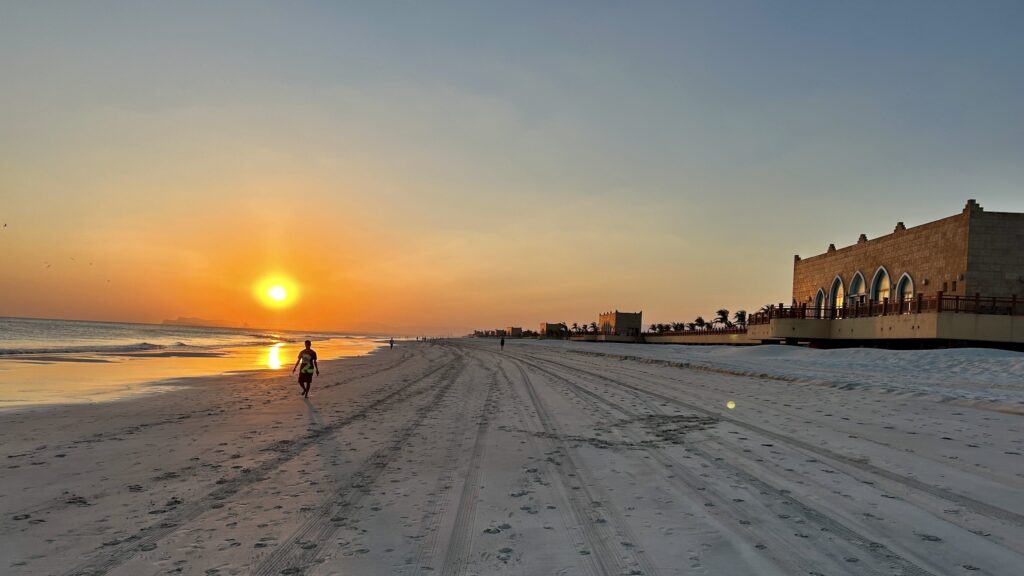
Cristina arrived in Salalah over six years ago, leaving behind her hometown of Padua, a city in northeastern Italy, in search of an adventure and a new beginning.
When she decided to pack her bags and leave her native land behind, Cristina had already heard the Arabian Peninsula. Her curiosity had grown over the years, fuelled by the obstacles that had kept her outside Omani borders. Sky-high prices and the requirement to visit only through organised tours were a problem then. But with a ticket in her pocket and a dream packed inside her new green suitcase, nothing could stand in her way.
When she finally set foot in the country, she chose not to rush things. She gave herself two months to travel from north to south, to observe faces, landscapes, and starry nights. She wanted to understand where she could put down roots, which place could truly become her home.
The desire to live abroad had been chasing her for years. Italy, beloved yet confining, was already behind her: what she needed was a new beginning. Oman had long been on her dream list, though for years it remained a mirage. Then the door opened: she had read that women could travel alone, and she went.
To find a home: Salalah
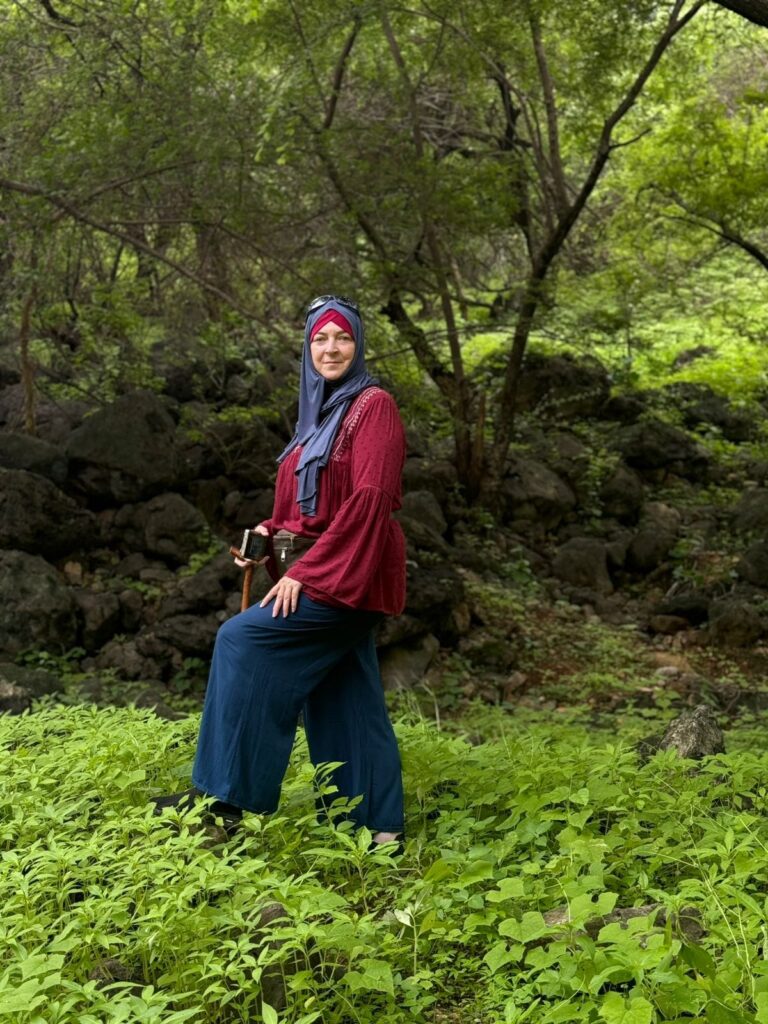
She chose to test herself during the worst two months of the year: 50 degrees Celsius, with humidity that pressed every breath against her chest. As soon as she arrived to Muscat she discovered it wasn’t the right fit for her. Too hot, too quiet in the evenings—a city that went to sleep early, just when she was still searching for life. So she took a bus to Salalah: 12 hours in the women’s section, crossing the silence of the desert. Without connection or sight of other cars, the dark was interrupted only by isolated buildings where the wind carried dust and steaming tea.
In that humid and vibrant atmosphere, between nights spent under the stars and new friendships, she realised she had found home. Cristina had arrived in Oman at its most flourishing time. And she fell in love.
Her arrival was a pleasant surprise. In Salalah the air was fresh, and the city was alive: it was Khareef, the monsoon season, which begins on June 21. Everything turned green, sudden waterfalls tumbled down rocks, families gathered for festivals. At night, life came alive: children playing in the streets until late, adults sitting outdoors, laughter echoing on the beach around a car parked facing the sea. She immediately understood what drew tourists from the Gulf to that marvellous city.
A new life project and the choice to convert to Islam
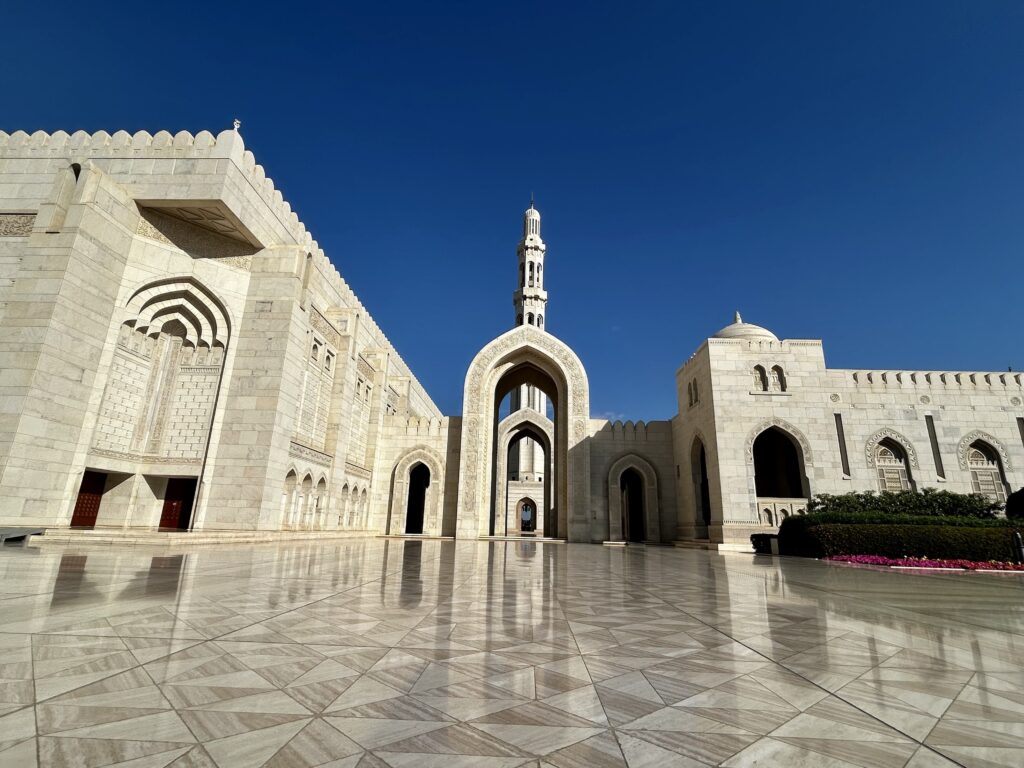
As soon as she found a way, Cristina began the path that soon led her to become a tour guide, making a name for herself in the area. Alongside this career, however, she also found herself facing another kind of life choice.
The smoke bubbles in the shisha as Cristina, gazing at the horizon of Salalah lounging, tells us how she embraced the Islamic faith.
“I have always believed in God, but I never truly connected with the Catholic religion. I knew there was something, but I couldn’t define what it was.”
This is how Cristina describes her inner journey, which began through daily life in Oman. From the moment she arrived, she was struck by the serenity and inner peace of the people. “Being Italian, I was always nervous,” she jokes, “but they always seemed calm and relaxed.”
Their tranquility and hospitality won her over. Stopping in the street to offer a ride, or inviting someone for a cup of hot tea: natural gestures, part of their culture. Seeing them pray intrigued her: “It gave me a sense of serenity. That’s how I started reading the Qur’an,” she recalls.
“Faith began to transmit serenity to me: in the Qur’an, nothing is tied to material aspects, and everything is entrusted to the will of God. If something happens, the only choice is to accept it as it is. Getting angry or rebelling serves no purpose: it is destiny, and must be welcomed with inner peace.”
During the difficult period of Covid, alone in a house that was far too big, loneliness grew and money started running out. With the arrival of Ramadan, Cristina began to pray, following YouTube videos—somewhat curious, somewhat awkwardly, somewhat courageously. At night she listened to the Qur’an, and little by little she found sleep again. “I felt good. I felt protected.”
September, first rains and new beginnings
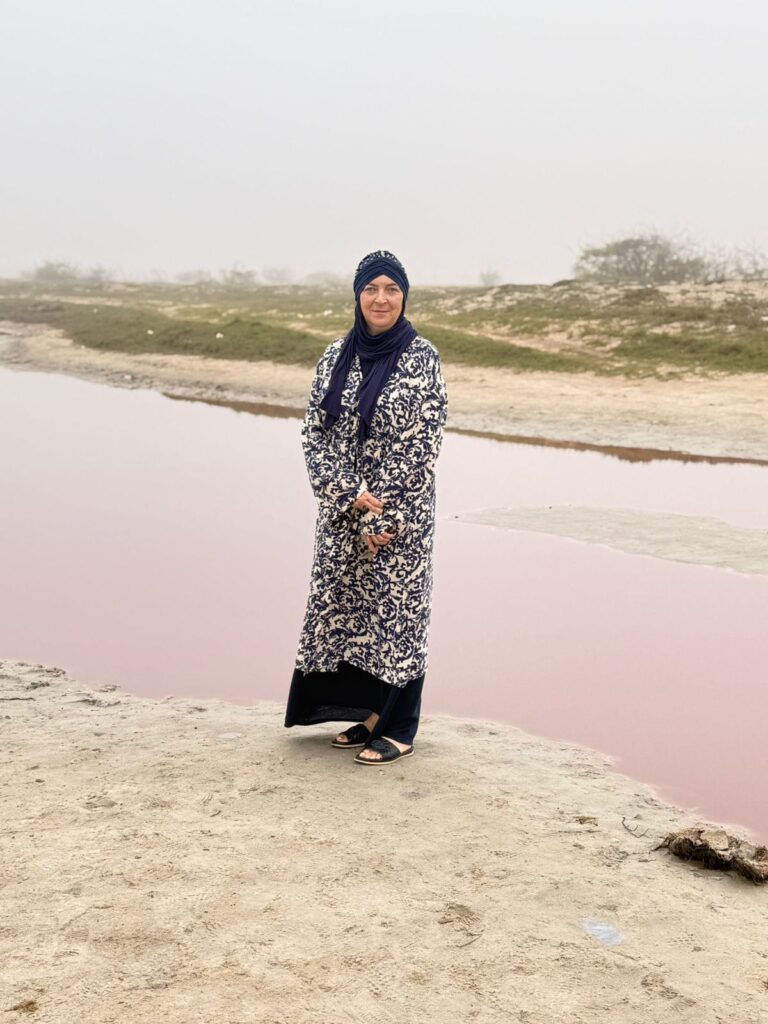
The return to Italy, in July 2021, was a moment of rupture. A half-empty suitcase, filled only with summer clothes, flip-flops, and a prayer rug. Between appointments to reconnect with people, job interviews, and tears of despair over the distance from what she now called home, autumn arrived quickly. Cristina felt its pressure hunting her: little money to spend on warm clothes, and no desire to stay.
Tears flowed at the memory of Oman and its kind, hospitable people. She kept praying, asking Allah to let her return. “If you allow me to go back to Oman, I will become Muslim,” she promised in her du’a.
It took only three days for the fateful phone call from across the border to arrive: a tour operator in Salalah was looking for a guide, and had heard of Cristina.
“I didn’t even want to know how much they would pay me. I just wanted to leave and go back home.”
It was the sign she had been waiting for.
She reached Dubai, facing bureaucracy and documents just to obtain the visa that would finally allow her to live in her beloved Oman.Back to her life in Oman, she resumed studying the Qur’an with an imam three times a week. Together they read sacred passages, speaking of the rights and duties of every Muslim. Her life became simple, marked by small joys. “Sitting in the mountains while someone prepares tea—that’s all I need.”
In Salalah, among monsoon rains and starry nights, she once again found her path. And in February 2022, with her Shahada, she made her testimony of faith and officially became Muslim.
Choosing to wear the veil
The choice to wear the veil is often contested in the Western world, seen as a violation of women’s freedom. In Cristina’s experience, she tells us, the veil was a completely personal decision, and never something imposed.
“It felt natural, as if I had been born this way.”
She tried it one day out of curiosity and fell in love with it. Since then, she can no longer imagine herself without it.
For her, the veil is not just an external symbol, but a reflection of a deeper spirituality. For many muslims, it is not an obligation, but an inner need: after conversion, each person chooses whether to wear it or not. And so she chose to make it part of her being.
“I felt good. I felt protected.”
Preserving Culture and the Challenges of Being a Foreigner in Oman
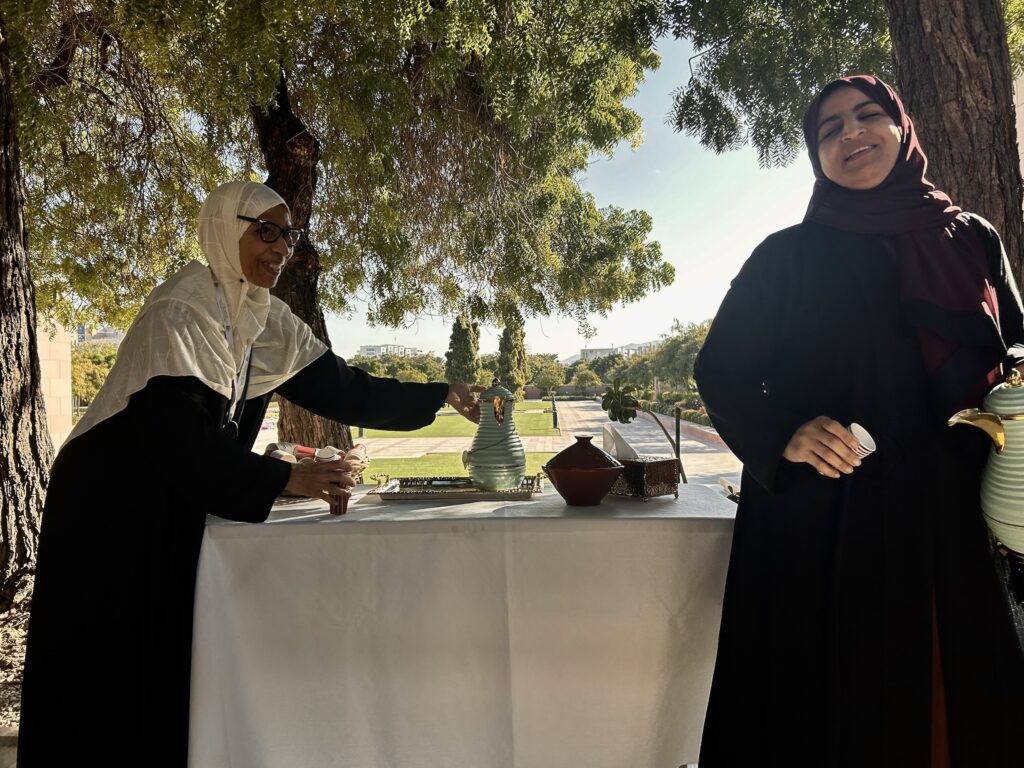
Oman is known as one of the few countries that refused to abandon its traditions in the name of modernity. With the goal of preserving its millennia-old history and culture, the country maintained for years a rather closed approach to tourism and immigration. More recently, however, partly due to the energy transition away from oil, Oman has opened its doors to tourism. This has caused the country to change rapidly: vendors in markets, once quiet and reserved, are now more insistent and tourist-oriented, and there is less emphasis on the honest transmission of local culture.
This shift, however, has not reached the “new Omanis,” who still find their freedoms limited within the country.
Today Cristina feels part of this land. In the souks and markets, everyone knows her and considers her one of them. But truly becoming Omani, on an official level, is not so simple. Gaining citizenship requires ten years of uninterrupted residence, a marriage to an Omani, and the renunciation of one’s own passport. “Becoming Omani as a foreigner is difficult,” she explains.
At the same time, living as a foreigner comes with limitations: there are no benefits for outsiders, she will not have a pension, and she cannot buy a house.
Yet, despite these challenges, Cristina remains deeply connected to Dhofar and its people. “Omani at heart, but with an Italian passport,” she says. Dressed in a long traditional gown, with a veil framing her face and illuminating her eyes, Cristina walks through the streets of Salalah as if it were truly her home.
Find more on @headabroad

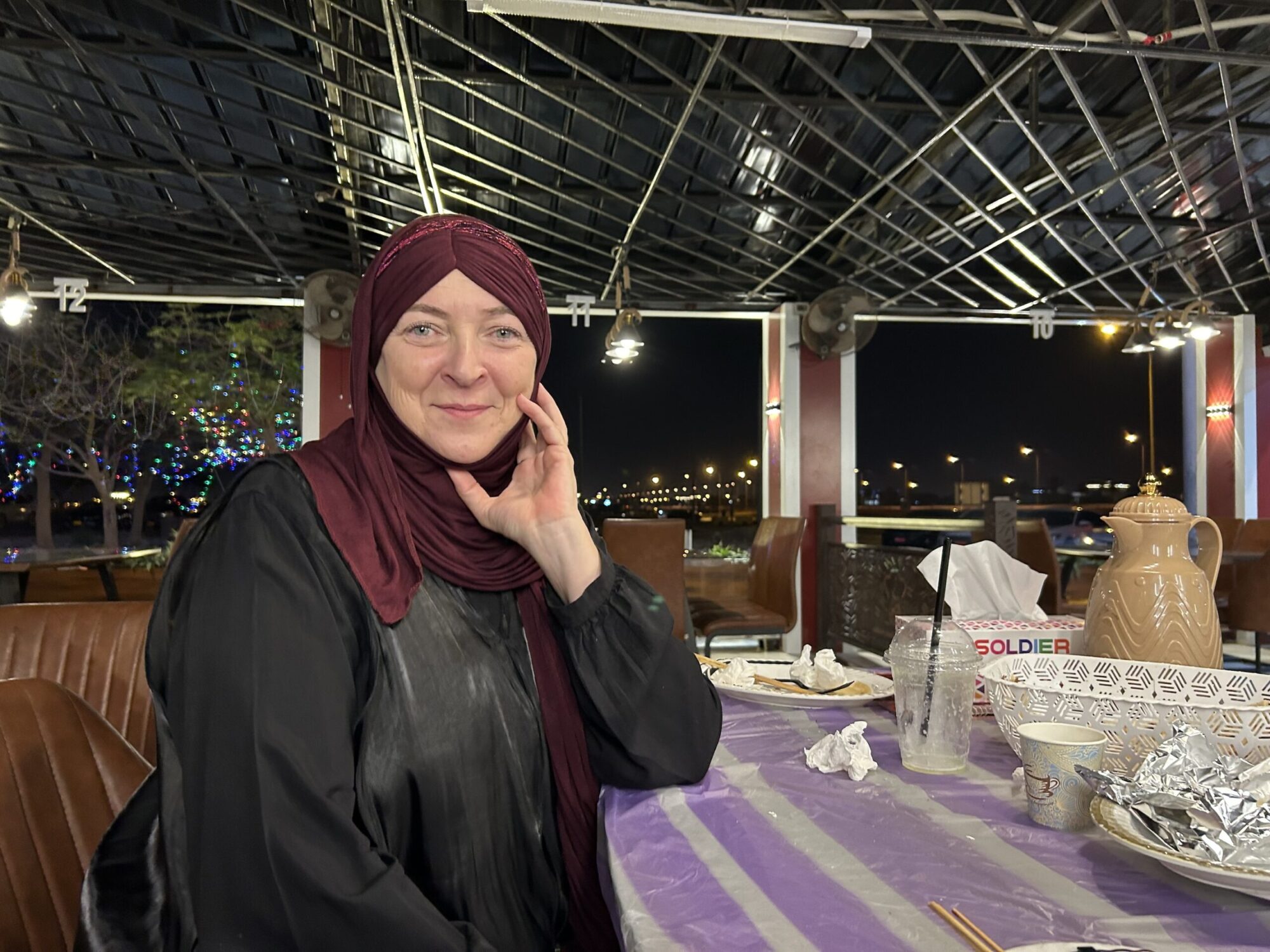
Bravo Cristina!!
Pingback:Travel Oman: Land of Timeless Wonders and The Legacy of Sultan Qaboos - HEAD ABROAD